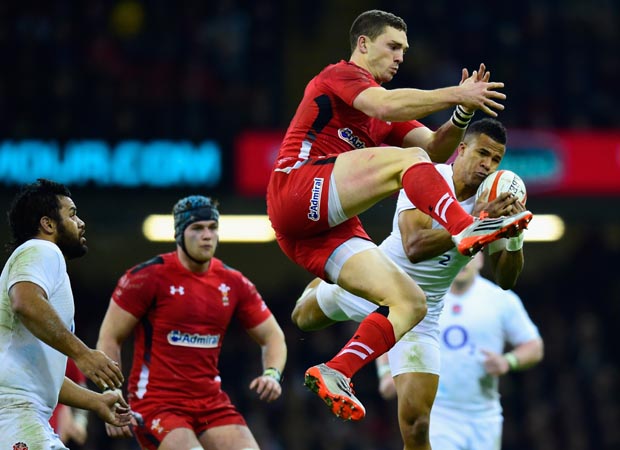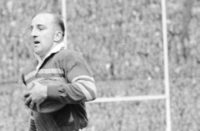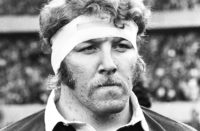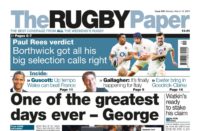 England had waited so long in the tunnel for any sign of the opposition that Chris Robshaw asked the referee: “How much longer are they going to be?''
England had waited so long in the tunnel for any sign of the opposition that Chris Robshaw asked the referee: “How much longer are they going to be?''
Standing behind his slightly exasperated captain, Mike Brown let it be known that Red Rose patience was about to run out.
“If they're not out in one minute, we're going back in,'' he said referring to the dressing-room.
At that point, the referee, Jerome Garces, rescued the stand-off from deteriorating into a farcical sit-down by instructing England to take the field as per the pre-match running order seven minutes before kick-off. Wales were supposed to follow 60 seconds later.
Once out into the darkness and chill, the visitors went into a huddle. The lights going out for England in Cardiff was hardly anything new but this time it was to clear the way for some theatrics which included a clip from a man who would probably have been hard pushed to recognise one end of a rugby ball from the other.
Dr Martin Luther King could be heard as part of the supporting act with an abbreviated clip of his most famous speech: “I have a dream that one day this nation will rise up….''
If it was meant to convey a subtle message that Wales were about to embark on another freedom march and inflict another nightmare on the neighbours, then the point would hardly have penetrated the English circle.
They stayed huddled for a mighty long time before Wales deigned to appear, a delayed entrance which resulted in the match kicking off at least six minutes late.
Had the Macchiavellian ploy been taken straight from the manual as written by the original Prince of Darkness, then it worked a treat. England had been caught so cold that they shipped ten points within the first ten minutes.
Even by the standards of a country potty about its rugby, this time the Welsh pottiness knew no bounds. All the guff about the roof, Warren Gatland naming his team 48 hours earlier than planned with the tacit implication that England didn't know theirs and endless replays of what happened when they were last in Cardiff made it all sound the next thing to a foregone conclusion.
England's insistence on starting the way they finished two years ago when they conceded 30 points without firing a shot merely sent the Welsh hype spinning into stratospheric levels of high definition.
And that was about as good as it got for Wales. It had gone midnight before the chariot came for to take England home and by then their opponents had been plunged into a darkness which will last all week and longer still should they lose again this coming weekend, at Murrayfield on Sunday.
Let there be no doubts about Friday night. The better team won and had they done so by at least 12 points instead of five, the most Cyclopic of one-eyed Welsh fans could not have complained.
Do not be deluded by the score. Wales were completely outplayed for the entire second half, from kick-off to the bitter end in a way that no England team had outplayed them since Jeff Probyn & Co put a hopelessly callow Welsh side to the sword at the Arms Park almost a quarter of a century ago.
This time Wales, built on the pillars of a collective 958 Test caps, towered over their opponents in terms of winning Grand Slams and Lions' series. This time, according to pundits on both sides of the Bridge, Wales held most, if not all, the aces.
What happened has left Gatland confronted with some grim realities. With the notable exception of Taulupe Faletau throughout and Rhys Webb over Ben Youngs in the first half, not one Welshman out-performed his opposite number.
The Welsh threequarters contributed alarmingly little, other than George North allowing Jonathan Joseph to give him the slip for the try that turned the game. North had taken a blow to the head requiring him to leave the field before half-time which will raise questions over the decision pronouncing him fit to resume.
A poor night for the Jamie Roberts -Jonathan Davies partnership would have been poorer still had Roberts been binned for a deliberate knock- on which all three officials missed.
Wales had nobody to compare with the real man of the match, James Haskell and, boy, did Danny Lydiate, one of Gatland's favourite players, suffer by comparison.
Haskell smacked into a padded post when it seemed easier to score and when he did dot the ball down.
After an England touchdown was ruled out by the TMO, Wales still had six minutes to save themselves and yet they were never able to engineer a position for a drop, let alone apply enough pressure for a penalty.
They did well to concede only three scrums all night and so minimise English exploitation of Gethin Jenkins' scrummaging, a weakness which may force Gatland to conclude that the time has come for the highly-rated Scarlets' loosehead.
The longer the game went, the more the Welsh pack ran out of power, hence their failure throughout the second half to secure one attacking position. Never mind, even the dirtiest cloud has a silver lining. The last time Wales began their year losing at home to England on a Friday night in February, they finished it within one point and one red card of reaching the World Cup final.



























Pingback: my blog